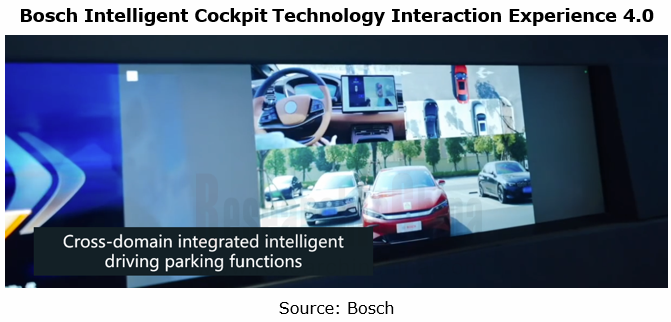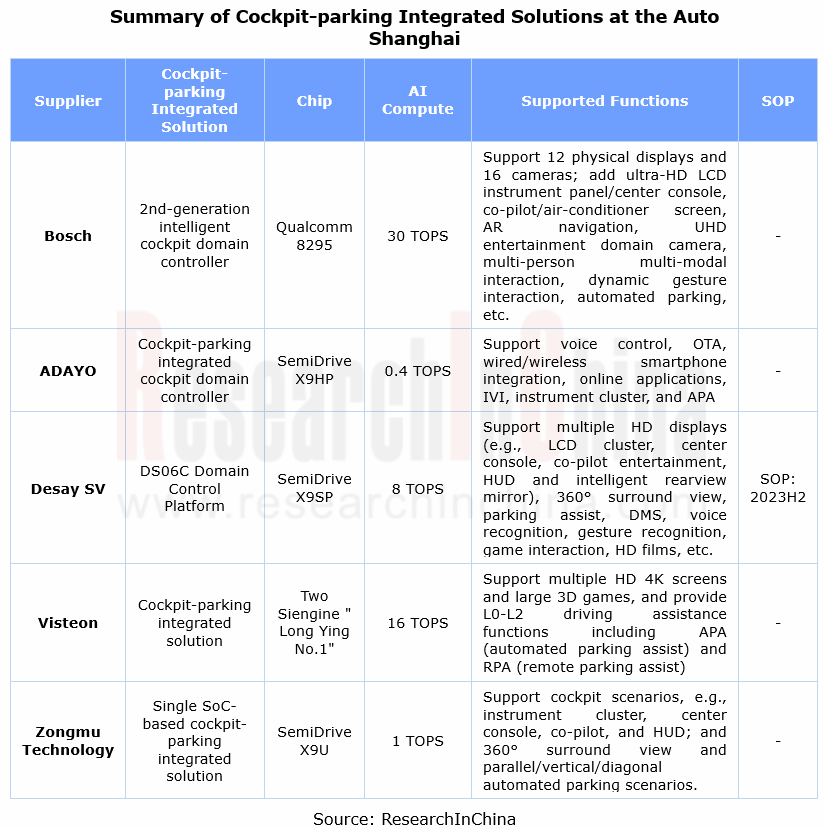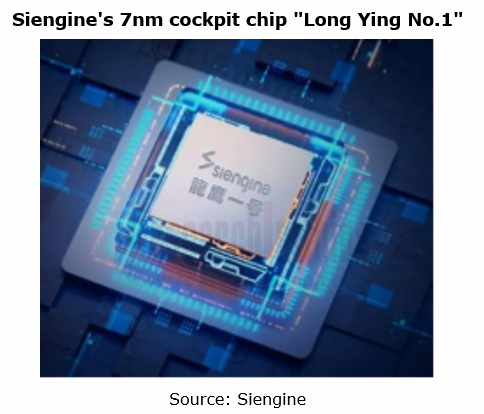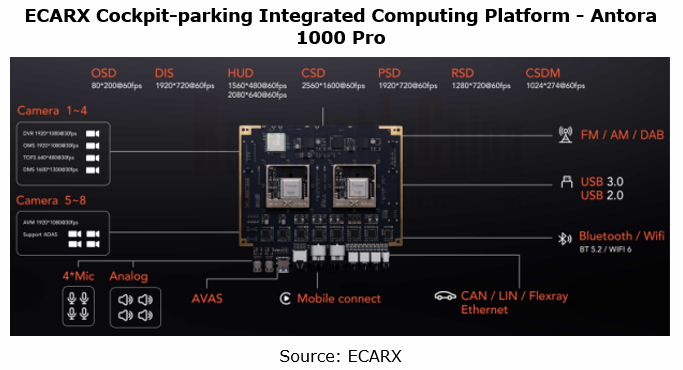Cockpit-parking integration research: cockpit-parking vs. driving-parking, which one is the optimal solution for cockpit-driving integration?
Cockpit-parking vs. driving-parking, which one is the optimal solution for cockpit-driving integration?
Currently, automotive E/E architecture is evolving from the distributed to domain centralized architecture, and will eventually be integrated into a central computing platform. In this process both cockpit-parking integration and driving-parking integration are products of domain centralized E/E architecture, and the ultimate form in the future is cockpit-driving integration.
Subject to the maturity of current chip and software technologies, the cockpit-parking solution is a transitional form to cockpit-driving integration. The solution integrates the parking function into the cockpit and allows the cockpit domain controller to receive parking signals, eliminating the cost of parking controllers.
The cockpit-parking integration offers the following benefits: first, cost reduction: the implementation of APA in the cockpit domain only needs addition of ultrasonic sensor (USS) and connector, bringing little cost pressure; second, better human-computer interaction design: the integration of the parking function into the cockpit enable the cockpit domain controller to gain more parking signals and use the rendering capability of the cockpit to improve the overall user experience of HMI; third, the computing power on the cockpit can be brought into full play.
From the comparison between the cockpit chip and the intelligent driving chip, it can be seen that the cockpit domain controller main SoC more highlights CPU and GPU, favoring the realization of such functions as environment puzzle and 3D rendering.
In terms of application fields, the cockpit-parking integrated solution is fitter to integrate basic parking functions, while for advanced parking functions like HPA and AVP, the driving-parking integrated solution is more suitable due to the needs for the driving perception system, and the functional safety level requirements.
Considering cost, lowly configured vehicle models are thus more likely to use the cockpit-parking solution, while medium and highly configured models with medium- and high-compute domain controller platforms will apply the driving-parking integrated solution.
The cockpit-parking integration track is heating up, and there are already more than ten Tier 1 players.
At present, more than ten Tier 1 suppliers have launched cockpit-parking integrated solutions. At the Auto Shanghai, six players introduced their solutions, including Bosch, ADAYO, Zongmu Technology and Voyager Technology. Among them, Bosch's Intelligent Cockpit Technology Interaction Experience 4.0, equipped with Qualcomm's high-compute chip, enables an infotainment domain platform providing seamless cockpit experience, and supports the cross-domain function of the "cockpit-parking integration".

At the Auto Shanghai, Desay SV introduced DS06C, its cockpit domain control platform based on SemiDrive's latest chip X9SP. The single chip can support multiple HD displays such as LCD cluster, center console, co-pilot entertainment, HUD and intelligent rearview mirror, and are available to application scenarios like 360° surround view, parking assist, DMS, voice recognition, gesture recognition, game interaction, and HD films.

High-end intelligent cockpit platform master chips show the trend of replacing foreign counterparts.
In the field of high-end intelligent cockpit platform master chip, there is a trend of replacing foreign products. For example, the "Long Ying No.1", a 7nm cockpit chip that Siengine launched in 2021, has broken the monopoly of Samsung, Qualcomm and Nvidia in this field.

The chip is equipped with Arm China's self-developed "Zhouyi" NPU and Arm IP. It adopts the ultra-large multi-core heterogeneous SoC design and integrates 87-layer circuits with 8.80 billion transistors. It packs an 8-core CPU with integral computing power up to 90K, of which the large core is Cortex-A76; a 14-core GPU with up to 900G floating-point operations; integrated programmable NPU core with the INT8 computing power up to 8TOPS; high-bandwidth low-latency LPDDR5 memory channel. It features a built-in cyber security engine that complies with national cryptographic algorithms, and the ASIL-D-compliant safety island design. At present, the chip has been installed in cockpit-parking integrated solutions of Visteon and ECARX.
2023 is the first year of mass production of cockpit-parking integrated solutions, and software capability building facilitates an upgrade to the cockpit-driving integration.
At present, the cockpit-parking integrated solution has been spawned and designated, including the cockpit-parking integrated platform jointly developed by Aptiv and ZEEKR and expected to debut in late 2023. Lynk 08 will carry ECARX’s Antora 1000 Pro computing platform with total NPU compute of 16 TOPS and total GPU compute of 1800G FLOPS, and is expected to be rolled out in August 2023. Dongfeng Forthing flagship MPV and Forthing Leiting will bear Yuanfeng Technology's intelligent cockpit platform based on Qualcomm 8155. In terms of production time, 2023 can be called the first year of volume production of cockpit-parking integrated solutions.

In response to the future trend for centralized architecture, Tier 1 suppliers work hard on planning and have even launched cockpit-driving integrated products. One example is Trinity Series, a cockpit-driving integrated product Zongmu Technology announced at the Auto Shanghai. SemiDrive is exploring centralized computing and has created a driving-parking-cockpit integrated solution which uses SemiDrive’s EMOS Platform to connect the centralized computing, cockpit and autonomous driving domains. The solution is based on service-oriented architecture (SOA) and introduces DDS communication.
The cockpit-driving integration requires an entire vehicle OS that manages all the tasks of the clusters for intelligent cockpit and autonomous driving. For this purpose, ECARX together with Volvo founded HaleyTek, an operating system company (with a 100-people team), and in March 2023 unveiled CloudPeak, an intelligent cockpit OS that features cross-domain system capabilities, is available to the Antora platform and also has access to 22 markets worldwide.
China Automotive Lighting and Ambient Lighting System Research Report, 2025
Automotive Lighting System Research: In 2025H1, Autonomous Driving System (ADS) Marker Lamps Saw an 11-Fold Year-on-Year Growth and the Installation Rate of Automotive LED Lighting Approached 90...
Ecological Domain and Automotive Hardware Expansion Research Report, 2025
ResearchInChina has released the Ecological Domain and Automotive Hardware Expansion Research Report, 2025, which delves into the application of various automotive extended hardware, supplier ecologic...
Automotive Seating Innovation Technology Trend Research Report, 2025
Automotive Seating Research: With Popularization of Comfort Functions, How to Properly "Stack Functions" for Seating?
This report studies the status quo of seating technologies and functions in aspe...
Research Report on Chinese Suppliers’ Overseas Layout of Intelligent Driving, 2025
Research on Overseas Layout of Intelligent Driving: There Are Multiple Challenges in Overseas Layout, and Light-Asset Cooperation with Foreign Suppliers Emerges as the Optimal Solution at Present
20...
High-Voltage Power Supply in New Energy Vehicle (BMS, BDU, Relay, Integrated Battery Box) Research Report, 2025
The high-voltage power supply system is a core component of new energy vehicles. The battery pack serves as the central energy source, with the capacity of power battery affecting the vehicle's range,...
Automotive Radio Frequency System-on-Chip (RF SoC) and Module Research Report, 2025
Automotive RF SoC Research: The Pace of Introducing "Nerve Endings" such as UWB, NTN Satellite Communication, NearLink, and WIFI into Intelligent Vehicles Quickens
RF SoC (Radio Frequency Syst...
Automotive Power Management ICs and Signal Chain Chips Industry Research Report, 2025
Analog chips are used to process continuous analog signals from the natural world, such as light, sound, electricity/magnetism, position/speed/acceleration, and temperature. They are mainly composed o...
Global and China Electronic Rearview Mirror Industry Report, 2025
Based on the installation location, electronic rearview mirrors can be divided into electronic interior rearview mirrors (i.e., streaming media rearview mirrors) and electronic exterior rearview mirro...
Intelligent Cockpit Tier 1 Supplier Research Report, 2025 (Chinese Companies)
Intelligent Cockpit Tier1 Suppliers Research: Emerging AI Cockpit Products Fuel Layout of Full-Scenario Cockpit Ecosystem
This report mainly analyzes the current layout, innovative products, and deve...
Next-generation Central and Zonal Communication Network Topology and Chip Industry Research Report, 2025
The automotive E/E architecture is evolving towards a "central computing + zonal control" architecture, where the central computing platform is responsible for high-computing-power tasks, and zonal co...
Vehicle-road-cloud Integration and C-V2X Industry Research Report, 2025
Vehicle-side C-V2X Application Scenarios: Transition from R16 to R17, Providing a Communication Base for High-level Autonomous Driving, with the C-V2X On-board Explosion Period Approaching
In 2024, t...
Intelligent Cockpit Patent Analysis Report, 2025
Patent Trend: Three Major Directions of Intelligent Cockpits in 2025
This report explores the development trends of cutting-edge intelligent cockpits from the perspective of patents. The research sco...
Smart Car Information Security (Cybersecurity and Data Security) Research Report, 2025
Research on Automotive Information Security: AI Fusion Intelligent Protection and Ecological Collaboration Ensure Cybersecurity and Data Security
At present, what are the security risks faced by inte...
New Energy Vehicle 800-1000V High-Voltage Architecture and Supply Chain Research Report, 2025
Research on 800-1000V Architecture: to be installed in over 7 million vehicles in 2030, marking the arrival of the era of full-domain high voltage and megawatt supercharging.
In 2025, the 800-1000V h...
Foreign Tier 1 ADAS Suppliers Industry Research Report 2025
Research on Overseas Tier 1 ADAS Suppliers: Three Paths for Foreign Enterprises to Transfer to NOA
Foreign Tier 1 ADAS suppliers are obviously lagging behind in the field of NOA.
In 2024, Aptiv (2.6...
VLA Large Model Applications in Automotive and Robotics Research Report, 2025
ResearchInChina releases "VLA Large Model Applications in Automotive and Robotics Research Report, 2025": The report summarizes and analyzes the technical origin, development stages, application cases...
OEMs’ Next-generation In-vehicle Infotainment (IVI) System Trends Report, 2025
ResearchInChina releases the "OEMs’ Next-generation In-vehicle Infotainment (IVI) System Trends Report, 2025", which sorts out iterative development context of mainstream automakers in terms of infota...
Autonomous Driving SoC Research Report, 2025
High-level intelligent driving penetration continues to increase, with large-scale upgrading of intelligent driving SoC in 2025
In 2024, the total sales volume of domestic passenger cars in China was...